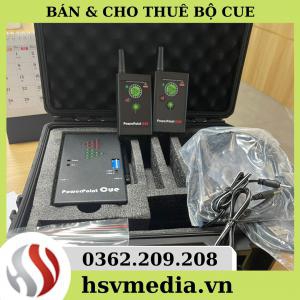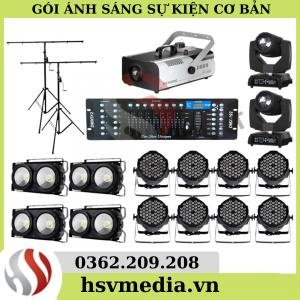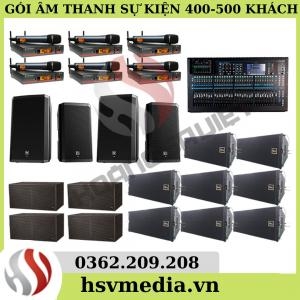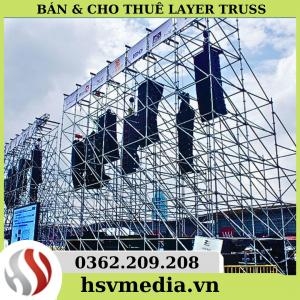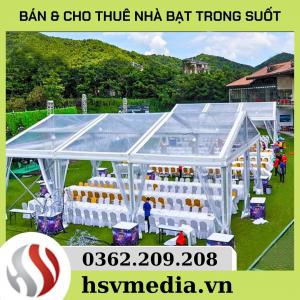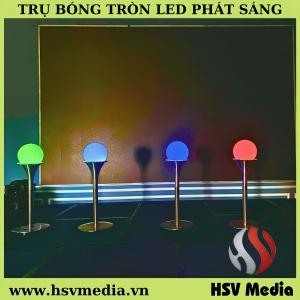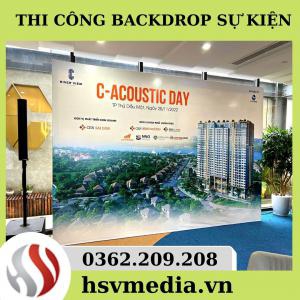The system is processing. Please wait a moment!
- Home Products Discover the Top News and Events in the Theater Industry Event Organizing Experience
Event Flow - Professional Event Organization Platform
Status: Stocking
TABLE OF CONTENTS
WHAT IS EVENT FLOW?
Event Flow is a detailed plan that shows the time sequence and content of activities that take place in an event. The goal of event flow is to ensure that all items are carried out logically, seamlessly, on schedule and consistently from start to finish.
Example of stages in event flow:
Before the event : Planning, implementing communication, preparing the location, welcoming guests.
During the event : Check-in, opening, main activities, breaks, closing.
After the event : Clean up the scene, survey guest feedback, summarize and report results.
Event flow acts as an operating manual , helping the organizing team control the process, coordinate smoothly and ensure the event takes place effectively, achieving the set goals.
.jpg)
HOW IMPORTANT IS EVENT FLOW IN AN EVENT?
Define and unify: Help the client and the event organizer agree on the content, format and flow of the program.
Effective time management: Ensure events run on schedule, avoiding delays or overlapping activities.
Help departments coordinate smoothly: It is the basis for related departments and individuals to clearly know their tasks and coordinate well with each other.
Risk control: Helps predict and have timely solutions to situations that arise during the event.
Optimize the attendee experience: When activities are organized in an orderly and smooth manner, attendees will feel comfortable, without having to wait too long or be interrupted between parts of the event.
Evaluation and lessons learned: After the event, the event flow is an important document to evaluate the effectiveness and draw lessons for the next event.
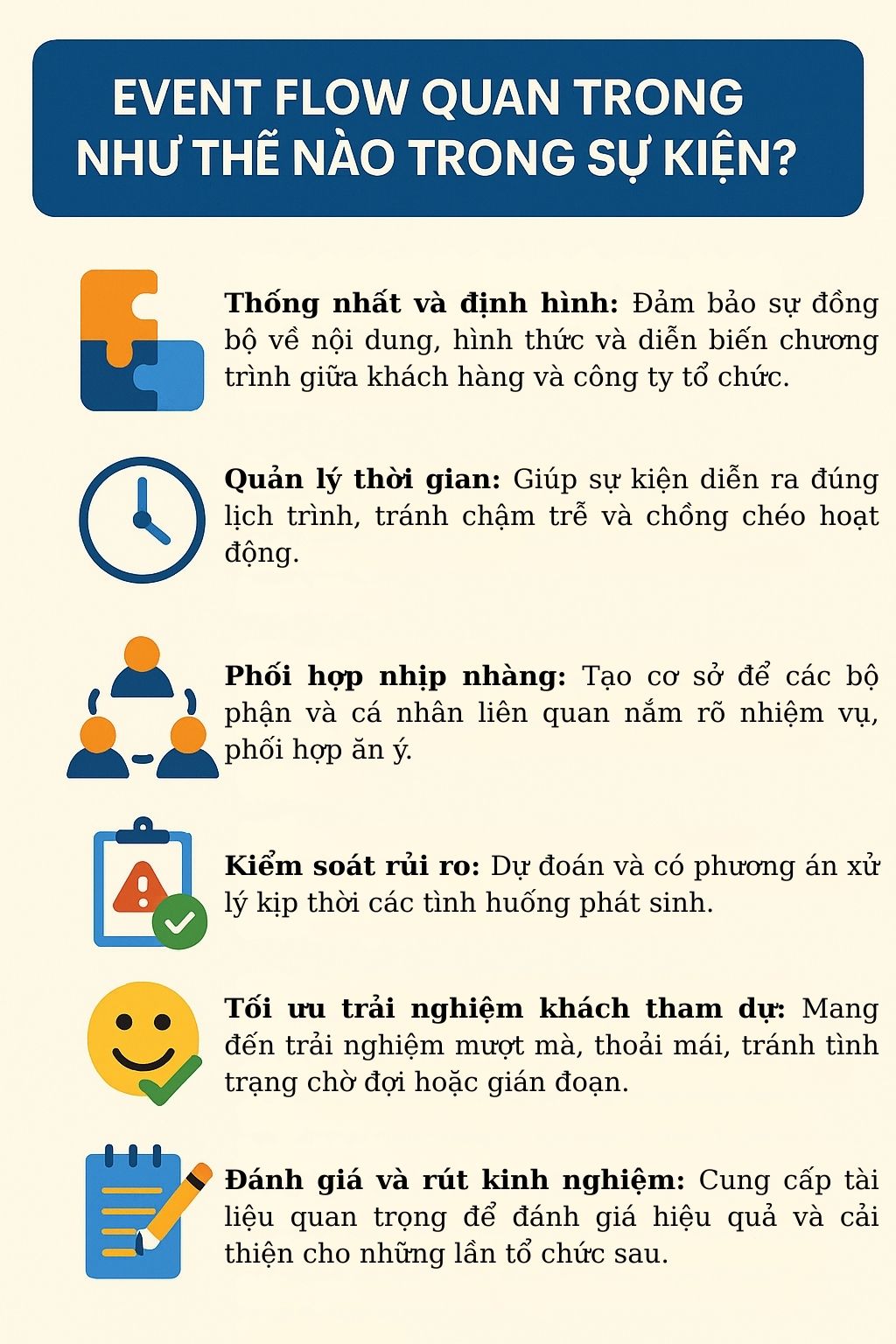
MAIN COMPONENTS OF EVENT FLOW IN EVENT ORGANIZATION
A professional Event Flow is not just a time table, but an operating system that helps everyone know what to do – when – where – with whom – how . Careful preparation of each element in the Event Flow is the key to a successful, smooth and impressive event.
1. Timeline
Meaning : A milestone that defines when each task or activity will begin and end.
Level of detail: Can be divided by time frame (eg: 10 minutes/block) or detailed to the minute/second if it is a live TV program or big show.
Role : Helps control progress, coordinate properly, limit overlap or prolong time.
2. Activities / Program content (Activities)
Meaning : Describes each item that takes place in the event, including both main and secondary parts.
Classification : Can be divided into: ceremonial activities (speech, opening), entertainment activities (performance, minigame), logistics activities (food, transportation).
Role : As the “backbone” of the program, it needs to be logical and consistent with the event's goals.
3. Responsible person (Responsibility / Owner)
Meaning : Clearly state who will perform or be responsible for each activity.
Typical staff MC, coordinator, receptionist, technical department (sound, lighting), program director, filming and photography crew, security, service...
Role : Avoid the situation of “no one knows who does what”, help run the event effectively.
4. Location / Zone
Meaning : Clearly identify each activity taking place in which area of the event space.
Role : Helps to arrange space reasonably, ensuring the flow of guests is coherent and logical.
5. Technical Cues / Notes
Meaning : Are technical instructions to support smooth operation.
Includes : lighting cues, sound, stage effects, LED screen projection, microphone order, equipment layout,...
Role : Vital to event directors and technicians, ensuring consistency between content and effects .
6. Special Notes (Optional)
Notes that are not technical but need to be emphasized:
Transition time
Waiting period
Backup in case of problems
Instructions for VIP guests, media, MC
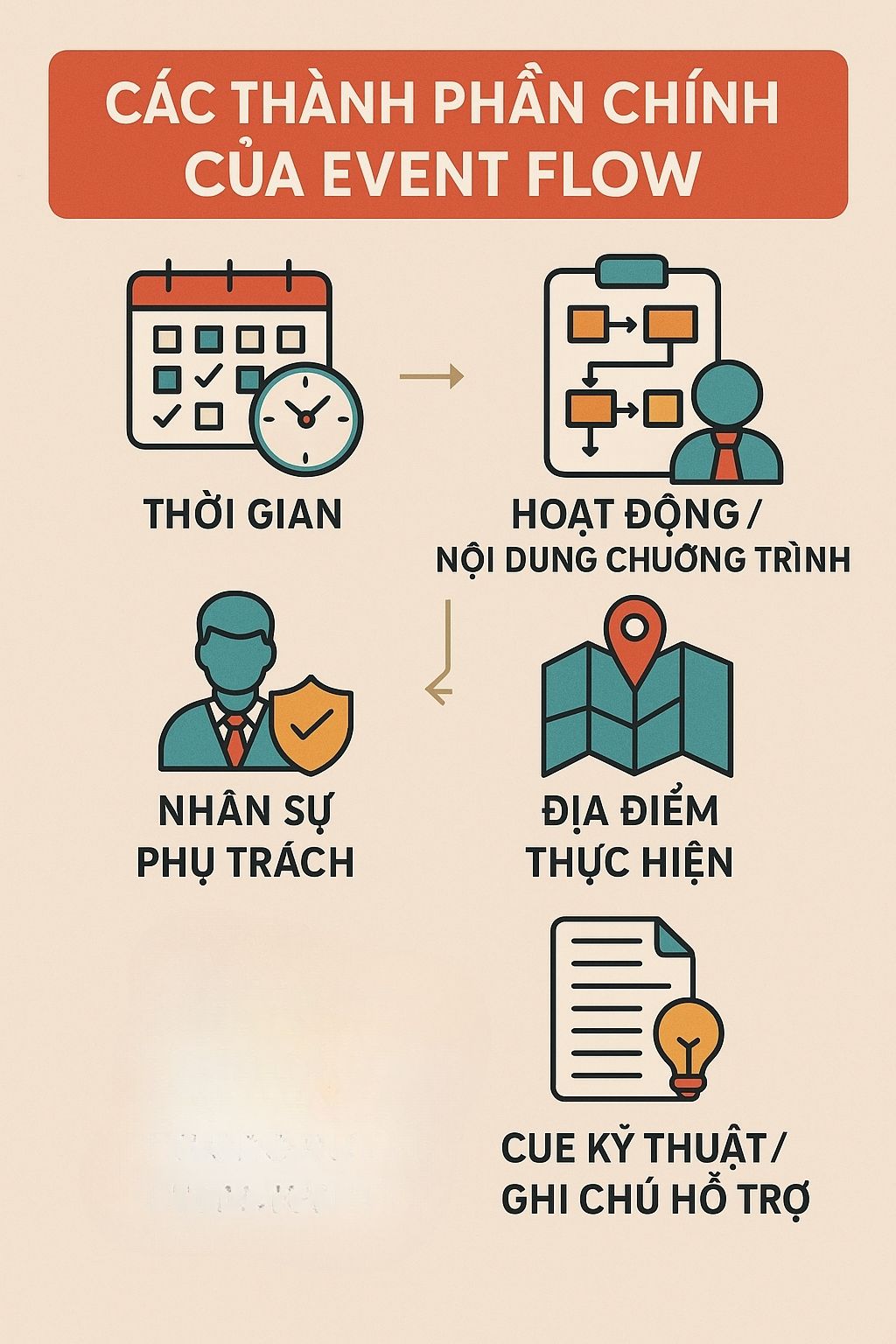
COMMON ERRORS WHEN BUILDING EVENT FLOWS AND HOW TO FIX THEM
1. Lack of detailed planning
Mistake: One of the most common mistakes is building an event flow that is too sketchy – lacking specific information about time, location, responsible personnel, or technical requirements.
Consequences: Can easily lead to program interruptions, delays, or confusion among coordinating departments.
How to fix:
Plan according to specific time blocks.
Clearly state
You can use a professional event flow template or project management tool (Trello, Google Sheet, Airtable...) to support.
2. Not taking into account the unexpected
Error: Only building the “ideal” event flow without planning for unexpected situations such as: equipment malfunction, late speakers, rain, power outages, VIP guests changing schedules, etc.
Consequences : Events are prone to confusion when things go wrong, losing control of timing and guest experience.
How to fix:
Always leave buffer time between important activities.
Prepare at least 1 – 2 alternative scenarios in the flow.
Have someone on hand to handle the situation (coordinator, stage manager, etc.).
3. Poor time management during implementation
Error: No progress monitor leads to sections running longer than expected or being hastily cut short.
Consequences : The event lacks coherence, loses its emotional impact, or otherwise affects the guest experience.
How to fix:
Ask a specific person to take on the role oftimekeeper.
The MC and program director need to understand the cue time clearly and be ready to cut or shorten when necessary.
Use a countdown timer backstage to remind MCs, speakers, and performing groups.
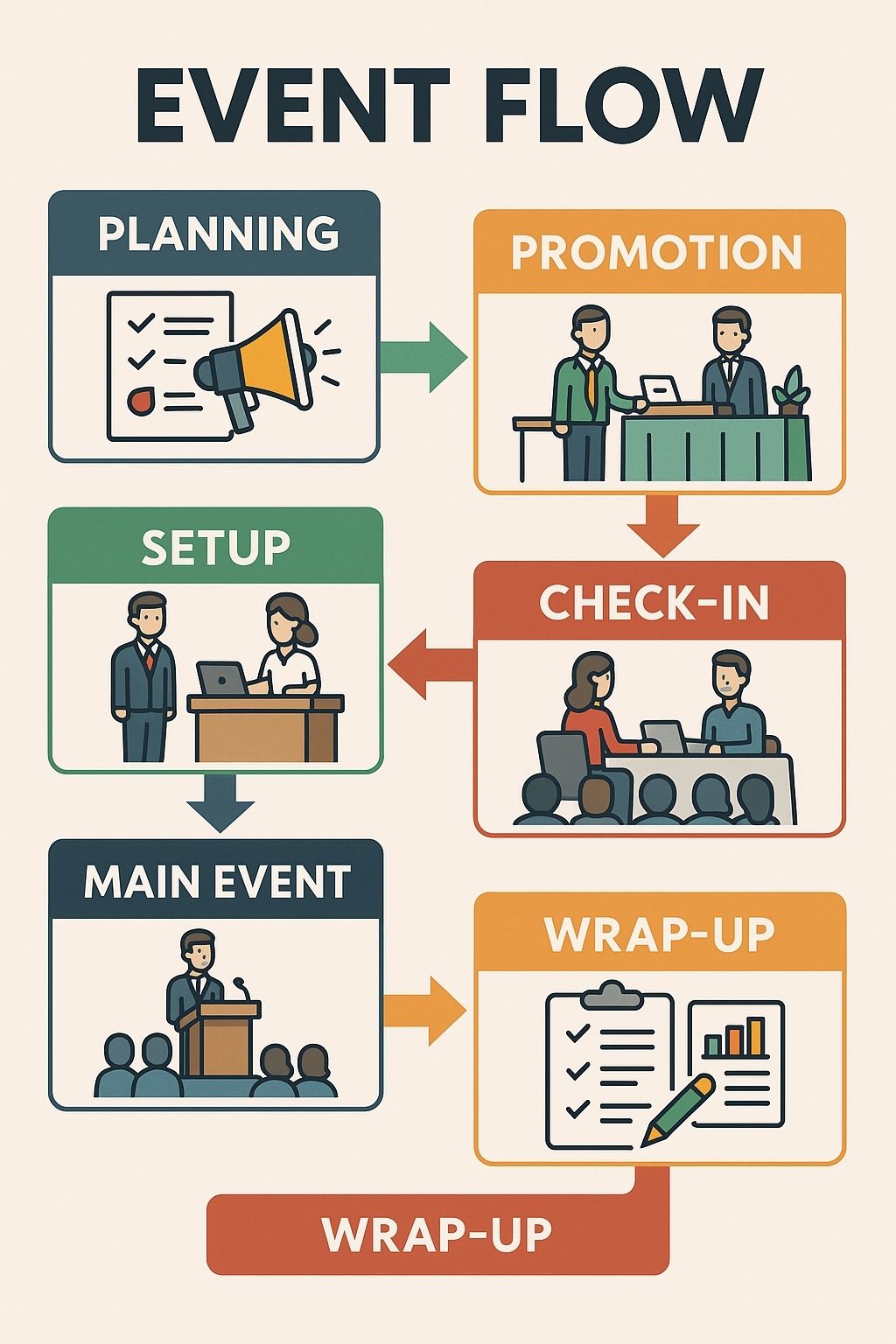
4. Lack of coordination between departments
Error: Teams (technical, logistics, reception, MC,...) work separately, not understanding the overall event flow.
Consequence : Each part “runs its own way”, easily causing duplication, cue delay or loss of effect.
How to fix:
Hold a thorough run-through meeting before the event.
Release thegeneral event flowandshow the detailed flowfor each related department.
There is a production team closely following the scene.
5. Not updating when there are changes
Error: After building the event flow, there were changes (in terms of personnel, time, content) but they were not updated in time.
Consequences : Causes confusion during implementation, directly affecting the quality of the event.
How to fix:
Use a shareable online flow (Google Sheet, Notion...) for continuous updates.
Update stakeholders with changes via email, group chat, or quick meetings.
Event Flow is not just a timeline, but the backbone of the entire event – where all activities are connected coherently, logically and professionally. Building a methodical event flow helps you control progress, minimize risks, optimize coordination between departments and ensure the best experience for guests.
Whether the event is large or small, internal or public, always take the time to design a complete - detailed - flexible event flow . This is the key factor to help you "keep the rhythm" for the entire program, from start to finish successfully.
If you are planning an event and need support in building a professional event flow, do not hesitate to contact HSV Media or use the available templates - management tools to optimize work performance!
CONTACT INFORMATION FOR EVENT ORGANIZATION CONSULTATION
Hotline: 0362.209.208
Address: 184/20 Le Dinh Can, Tan Tao Ward, Binh Tan District, HCMC
Event Equipment Rental Service Quote
Hiện chưa có đánh giá nào về sản phẩm này!





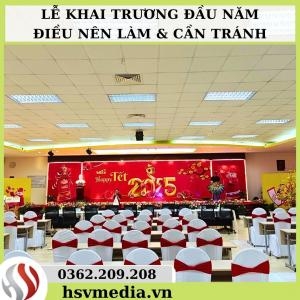
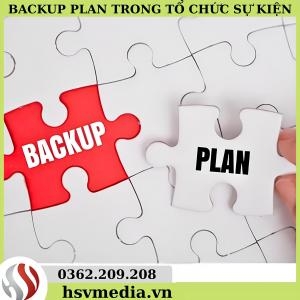




.jpg)
.jpg)
.jpg)
.jpg)
